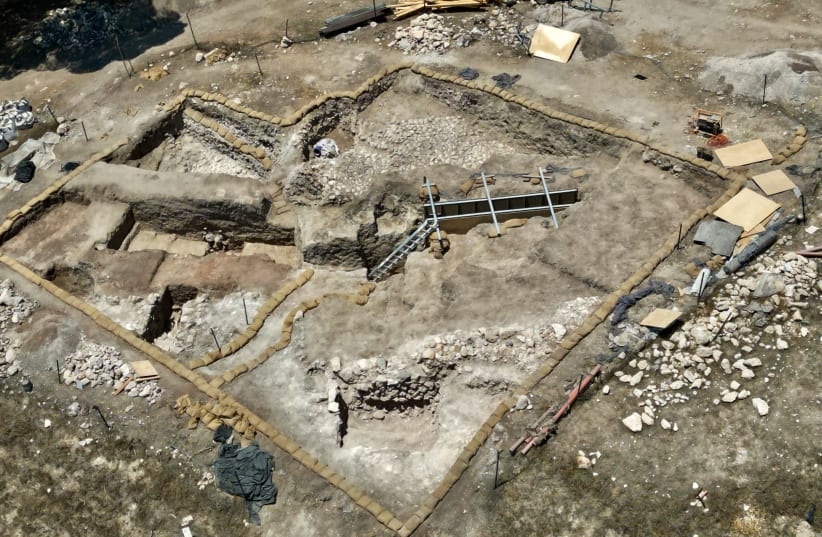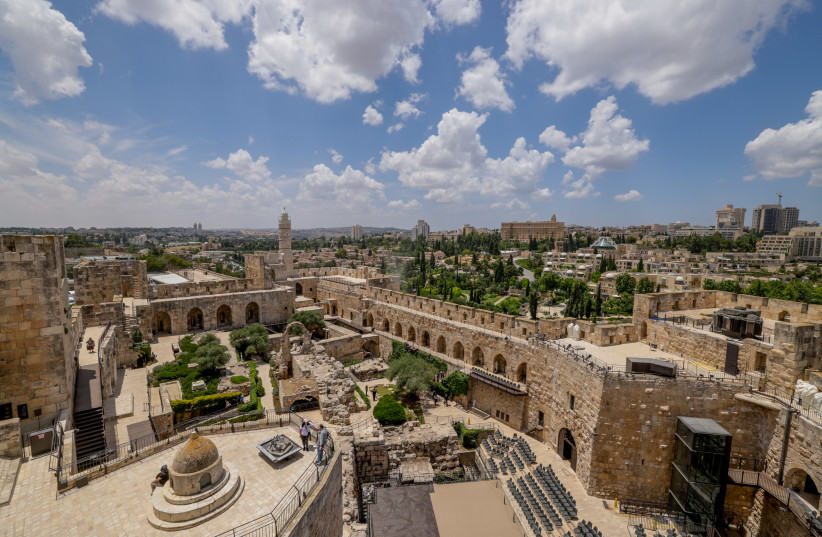The TRT World article posits that Israel’s leaders have engaged in a systematic effort to erase and rewrite history, employing archaeology as a “key tactic serving Israel’s occupation agenda.”
JERUSALEM POST STAFF FEBRUARY 8, 2024 08:31
Updated: FEBRUARY 8, 2024 08:53

Aerial view showing stone-covered plaza scheduled for future excavation to access the passageway with the corbelled vault, Tel Shimron.In a controversial op-ed featured on TRT World, a Turkish news site, authors Burak Elmali and Elif Cook level serious accusations against Israel, alleging that the nation has “weaponized archaeology” to “deny the existence of Palestine and Palestinians,” essentially charging Israel with “twisting historical findings” to bolster the Zionist narrative of “a land without a people for a people without a land.” This exaggerated claim puts a spotlight on the contentious intersection of archaeology and politics in one of the world’s most disputed territories.
lmali serves as a researcher at the TRT World Research Centre in Istanbul. His expertise is in Turkish foreign policy and major power politics.
Cook, on the other hand, works as a Social Awareness and Corporate Partnership Project specialist at TRT World Citizen and is also pursuing her PhD at Istanbul University in Museum Management.
The TRT World article posits that Israel’s leaders have engaged in a systematic effort to erase and rewrite history, employing archaeology as a “key tactic serving Israel’s occupation agenda.” This narrative suggests a deliberate manipulation of the past, where archaeological discoveries are selectively interpreted or highlighted to reinforce the Zionist claim to the land.
However, this portrayal simplifies the complex and multifaceted nature of archaeological research in the region. Israel’s archaeological sites and projects, far from being monolithic instruments of state propaganda, are part of a global scientific community dedicated to uncovering the ancient world. These endeavors have unearthed evidence of the myriad cultures and peoples that have called this land home, from ancient Israelites and Canaanites to Byzantine Christians and Muslims.

The Tower of David Museum recounts the story of Jerusalem, from the Canaanite era to the modern state. (credit: MARC ISRAEL SELLEM)
Critique fails to account for Israeli archeology’s inclusivity, diversity
The critique offered by Elmali and Cook that “the Jewish leaders systematically erase history” to perpetuate foundational myths fails to account for the inclusivity and diversity of archaeological work in Israel. Sites like the City of David, while certainly significant to Jewish history, also reveal layers history that span beyond a single narrative, offering insights into the region’s complex past.
Archaeological findings in Israel have revealed layers of history that reflect the region’s diverse cultural and ethnic heritage. For example, the discovery of the 9th century BCE Tel Dan Stele offers historical proof of King David’s dynasty, corroborating biblical narratives while also aligning with broader historical records of the region’s ancient past. This and other discoveries, such as the Pool of Siloam and the Pilate Stone, provide tangible links to periods and figures mentioned in both Jewish and Christian texts, without negating the historical presence of other peoples.
In addition, Israeli archaeological sites are often excavated and studied in partnership with international institutions, ensuring that research methodologies and findings undergo rigorous scrutiny. This collaborative approach ensures that archaeological work is not isolated or biased toward a single narrative but contributes to a global understanding of ancient history. Museums and archaeological parks across Israel, including the Israel Museum in Jerusalem and the archaeological sites in Megiddo and Masada, showcase artifacts from a multitude of periods and cultures, including Canaanite, Israelite, Hellenistic, Roman, Byzantine, Islamic, and Ottoman. This inclusivity underlines a commitment to preserving and presenting the rich tapestry of the land’s history, contrary to claims of erasure or exclusion.
Furthermore, archaeological research in Israel is subject to academic and legal oversight, including the Israel Antiquities Authority (IAA), which mandates the preservation of sites of historical significance across diverse cultural and historical periods. The IAA’s work emphasizes the protection and study of archaeological heritage for all humanity, challenging the notion that the discipline is exploited for ideological purposes.
The claims of Elmali and Cook, overlook the broader scope and integrity of archaeological practice in Israel. While it is undeniable that historical narratives play a significant role in the identity and politics of any nation, reducing archaeological research to a mere tool of political ideology does not do justice to the discipline’s commitment to uncovering the past. Archaeology in Israel, as elsewhere, remains a key to understanding our shared human heritage, transcending contemporary political divides.
Content retrieved from: https://www.jpost.com/middle-east/article-785758.